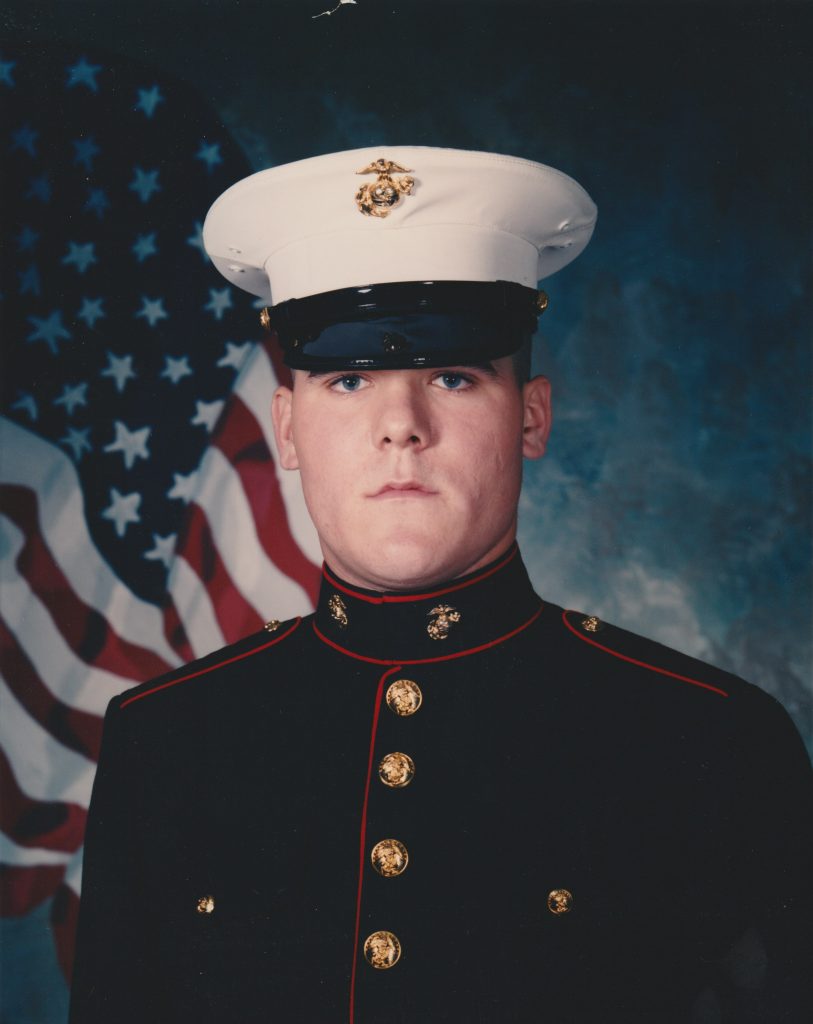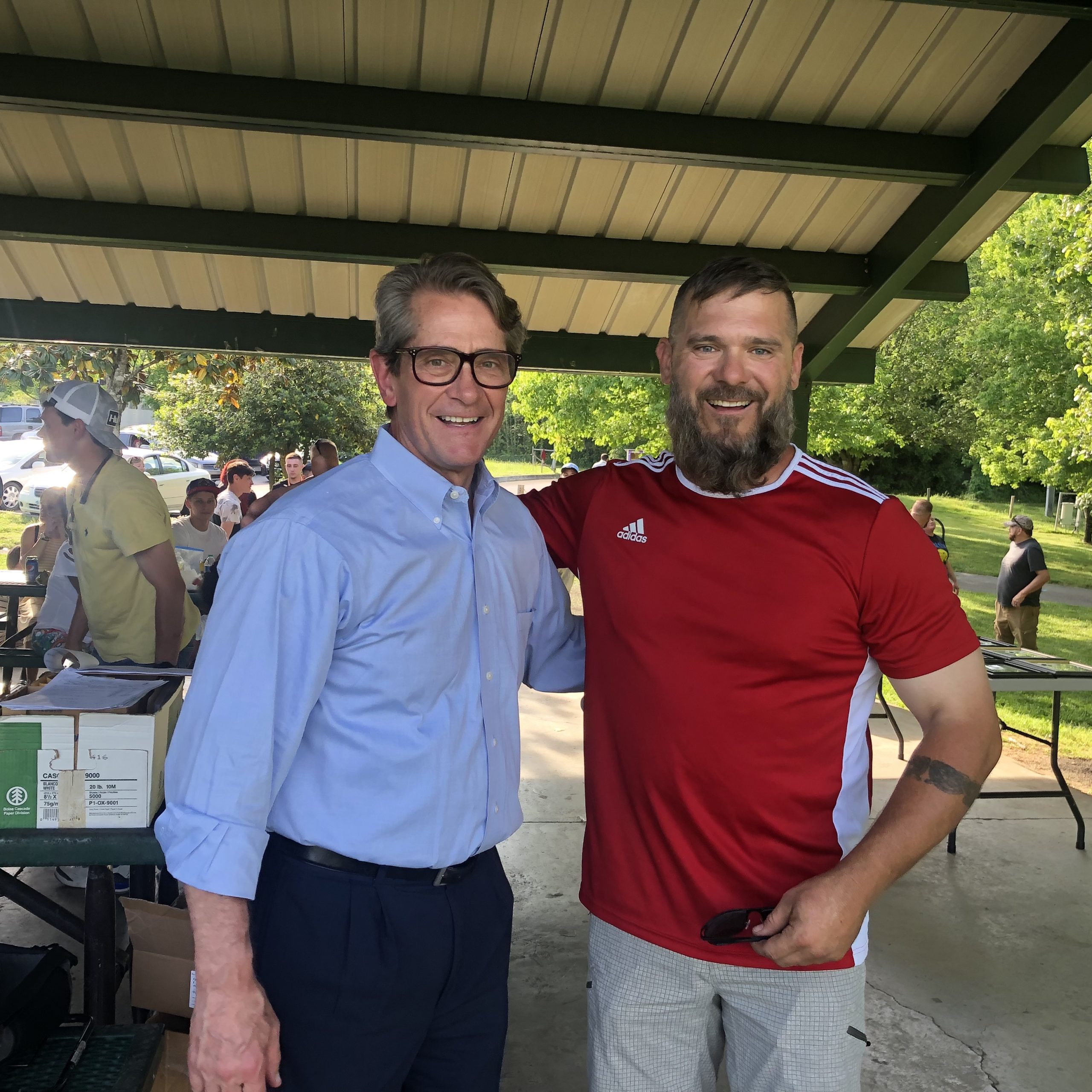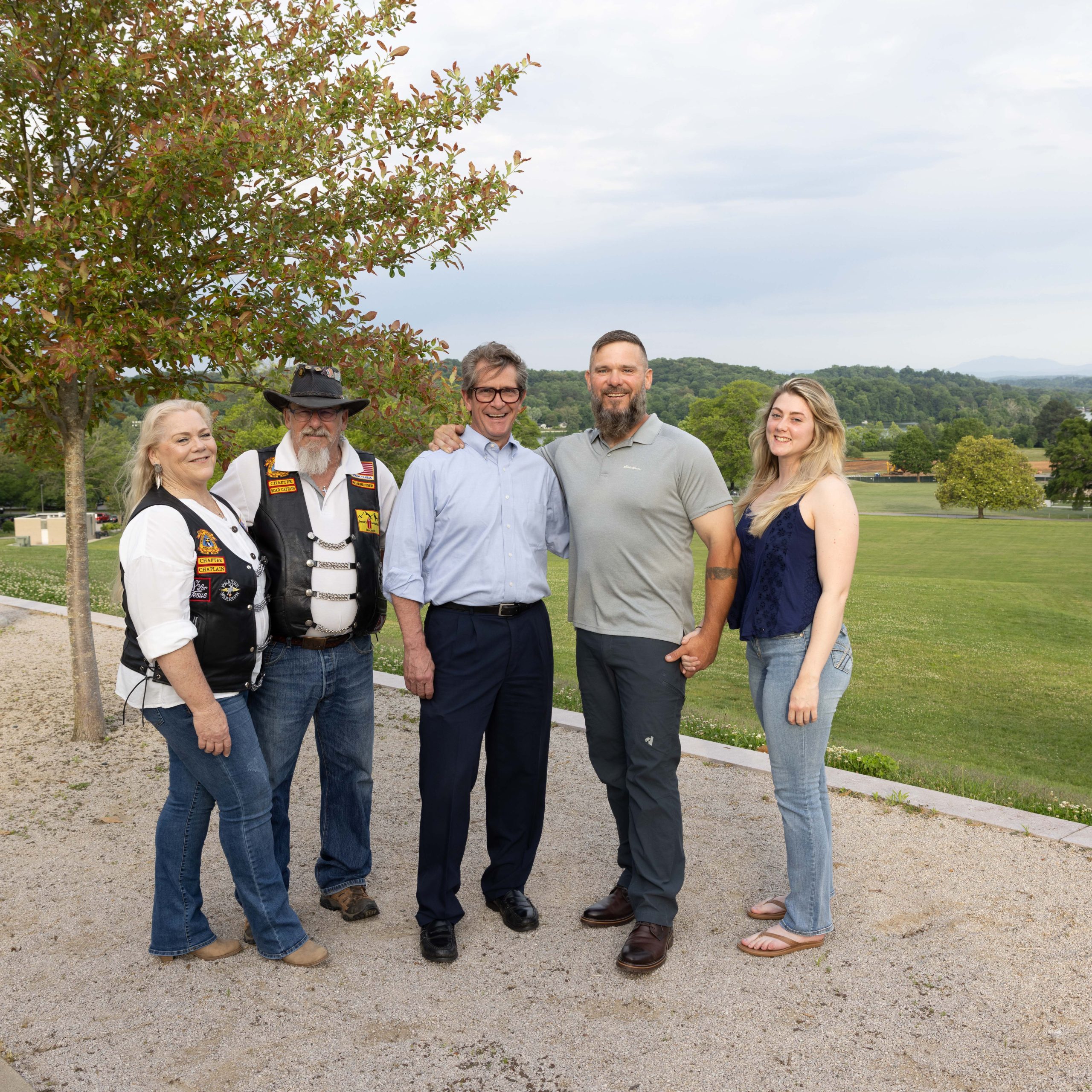Chuck Cerny’s Veterans Treatment Court vision is changing lives and destinies
It doesn’t take long when talking with Jarod Correll to surmise that he’s a Marine at heart, a tough dude, a fighter, a “black-and-white guy,” as he puts it. By virtue of his rough upbringing and military training, he doesn’t come off as one to let emotions show too often.
During a lengthy, candid conversation about the many ways the Knox County Veterans Treatment Court has transformed his life since he hit rock bottom three years ago—from drug addiction, prison, homelessness, and broken relationships to freedom, health, hope, and restoration—tears come to Correll’s eyes one time. And, as you might guess, it’s when the subject turns to his mama.
“It got to where she wouldn’t even talk to me, she was so scared I was going to end up dead,” says Correll, recalling the lowest points of his journey. His voice cracks. “But now, she runs up to people and says, ‘This is my son! Please meet my son!’”
Somewhere between those two extremes of a mother’s sleepless-night fear and her beaming pride, Jarod Correll quite nearly did wind up on a coroner’s slab—more than once. The life he now leads is a testament to the power of timely intervention, the kind that comes with a strong dose of caring, tough love.
The Veterans Treatment Court program, run by Judge Chuck Cerny, “changed my life,” Correll says. “You have to understand where I was. Until you realize how drastic it was, you really can’t grasp the depth of my gratitude.”
Today, Correll is among hundreds of East Tennessee military veterans who have benefited from one of the area’s recovery court treatment programs, such as those operated in Knox County, in Blount County, and in the Fourth Judicial District whose reach includes Sevier County.
Visiting with some of the judges and staff members who administer the veterans’ treatment courts is nothing short of inspiring. Their perspectives—and the difference the programs are making every day, one vet at a time—serve to buoy the spirits of any who might wonder whether real hope exists for those who have returned from military service bearing deep scars that sometimes lead them into depression, addiction, destructive behavior, and the criminal-justice system.
Raw Deal
Correll’s journey on that continuum began at a young age. He was born in Indiana, with a father who, he says, was a “P.O.S.” who later died in prison. “I grew up with drugs. My whole family was involved in drugs,” he reflects.

He and his single mom moved around a lot before settling in Tennessee, where Correll graduated from Oak Ridge High School in 1997 before enlisting in the U.S. Marine Corps and being shipped to Camp Lejeune in North Carolina for basic training, and then to Okinawa, Japan.
When he later returned to Knoxville as a reservist, Correll reverted to some of his old ways (“I grew up with drugs and was dealing ecstasy at the ripe old age of 17,” he says) and was arrested transporting drugs from Florida back to Tennessee—one month short of completing four years in the Marines. Those charges resulted in a prison sentence, part of a downward spiral that would not unwind until a final arrest and near-death trip to the hospital.
What he calls “some ups and downs” of his life included drug abuse, dealing, felony charges, jail time,
a painkiller addiction, court-ordered group therapy, living in a car, probation, the collapse of his marriage, and the death of a beloved cousin. His “last straw” came in 2019, when he awoke in the ER after overdosing. “They had to bring me back to life five times,” he says. “I had been on the run forever, and I was finally sick of my own shit.”
A public defender referred Correll to the Knox County Veterans Treatment Court. “I had no other options,” he concedes.
As he worked through the recovery process, Correll came to respect and admire presiding Judge Chuck Cerny of the Sixth Judicial Court, which includes Knox County. “Judge Cerny helped me in every way; the guy’s a saint,” Correll says. “Growing up without a father, I had my own perception of what a man should be. Only two or three men in my life I can say I respect to the utmost. Judge Cerny is one of them. He’s generous and kind.”
Beyond Justice
Cerny, who was first elected in 1998, helped to launch the Knox County Veterans Treatment Court in 2013. “I am so proud of Jarod and what he has been able to accomplish,” Cerny says. “He not only completed the program, but he set about educating himself in a profession to make his life better.”
The reasons Cerny wanted to be part of a veterans treatment court boil down to a bedrock principle: “I don’t believe any human being is disposable.”
“The majority of veterans who get involved in the criminal-justice system do so as a direct result of addiction, mental-health issues, brain injuries, or other trauma experienced while in military service. Treating them with dignity and respect not only helps them get out of the system, but it makes our community safer, and it saves taxpayer dollars, because those folks don’t have to be incarcerated.”
Each year, Cerny and the Knox County program serve veterans spanning a wide range of military branches and experiences. “We see males and females, older folks from the Vietnam era,” he says, “and those from more recent conflicts—soldiers with combat exposure in Afghanistan or Iraq.”
The program takes between 18 months and two years for a veteran to complete and has shown measurable success. “We like to point to a recidivism rate of only about 10 percent of our grads who end up in the criminal-justice system again,” Cerny says. “If you graduate, you are paying off restitution, you pay the victims back, pay your court costs, your taxes.”

For Cerny, there is an added layer of motivation. His father fled Czechoslovakia (now the Czech Republic) after World War II and emigrated to the U.S. “He wanted to live in a country where he knew people could be free. He was always so grateful to be a [naturalized] citizen. I share that feeling of gratitude for our nation and for those who have fought to protect it. I know that veterans are not immune from getting in trouble, but that doesn’t mean we should give up on them or forget about them; they are valuable and redeemable.”
Ron Hanaver, director of the Knox County Recovery Court, was there with Cerny at the beginning, connecting with mental-health professionals and area veterans. “We got together and started planning” a court program just for vets, Hanaver says.
The program has partnered with local agencies to identify veterans who might benefit. “We will take anybody if they’ve served even one day in the military, because all we can do is help,” he says. “And that is our motto: all we can do is help.”
They have indeed helped, but they are far from alone in East Tennessee.
Life-changing Services
Blount County’s veterans’ program, which started in 2017 under the umbrella of the county’s recovery court, has two components: a Circuit Court arm presided over by Judge Tammy Harrington and a General Sessions Court arm presided over by Judge Mike Gallegos.
“It’s amazing to see the turnarounds in these individuals,” Gallegos says. “We’ve seen veterans go from multiple arrests, in and out of jail, addictions, to now working full time, going to college, leading happy, productive lives.”
The program typically lasts at least 19 months as participants move through several phases, Gallegos says. “You don’t want to push people along too quickly. Some come in thinking, I can get this done fast. As they start learning and benefiting, they’re in no hurry. They realize this is what’s giving you structure, bringing you around. I don’t see anyone chomping at the bit to get out.”
That doesn’t mean the road is without bumps. “It’s a very difficult program, because, let’s face it, one of the hardest things to do is change, to accept that you’re on the wrong path. That can be very challenging, emotionally and mentally.”
If not for the program, he says, many of the veterans would likely remain in a revolving door of “short stints in jail, back out, problem, back in—and then potentially death. We hear every day about veterans dying of drug addiction or suicide.”
Toward the east, the Fourth Judicial District Drug Recovery Court, presided over by Judge Duane Slone, also provides a place for many veterans to find life-changing help and services. The program launched in 2009.
“Programs like ours teach people how to live differently,” says Director Patty Williams, who oversees the activities of the recovery court and coordinates the efforts of its team. Similar to the others, the program takes roughly 18 months to complete.
“The recovery court allows more time to personally work with individuals in helping them develop support networks and rebuild their lives, learning new skills they never really had before,” Williams says.
Living Differently
In some veterans treatment court programs, like Knox County’s, participants are paired with a fellow veteran who serves as a mentor, a trained, screened volunteer to help the participant along. Despite the assistance provided by these volunteers—along with the judges, program staff, community resources and other willing aids—Knox County grad Jarod Correll emphasizes that completing a court recovery program begins and ends with a resolve within the participant.

“I am 100 percent behind” the programs, says Correll, who now has a career as a crane operator helping to build bridges and other structures, “but it’s all on the individual. A lot of people I’ve seen are just biding time in the system until they can get high again. If you’re not ready to be all in, you won’t make it. Some look at it like a punishment, but it’s an opportunity. If people are willing to work and search out the help, it’s there. And if you look at it as an opportunity, it turns into a blessing.
“My life is a thousand times better now. I’m free and clear and livin’ my best life, and I don’t ever want to go back.”
With that outlook, it’s no wonder Correll’s mama is proud enough to brag on him to everyone she meets, speaking those words that every boy and man longs to hear: “This is my son!”

Comments are closed.